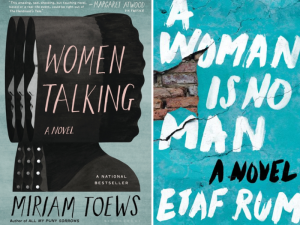
by Chanel Dubofsky
Female Rebellion Challenges Patriarchy in Two New Novels
 “Revolutions don’t come from a place of happiness,” writes Etaf Rum, in her debut novel, A Woman is No Man. The narrative flips between two, sometimes more, perspectives—Isra, a Palestinian woman who leaves her home in the early 1990s to marry Adam, a man she has met only once, and move to Bay Ridge, Brooklyn, and Deya, Isra’s oldest daughter, navigating through her senior year of high school in 2008, while trying to convince her grandparents that she should be able to go to college instead of getting married. It’s a story of insularity, brutality—and the redemption that can come from women’s quiet revolutions.
“Revolutions don’t come from a place of happiness,” writes Etaf Rum, in her debut novel, A Woman is No Man. The narrative flips between two, sometimes more, perspectives—Isra, a Palestinian woman who leaves her home in the early 1990s to marry Adam, a man she has met only once, and move to Bay Ridge, Brooklyn, and Deya, Isra’s oldest daughter, navigating through her senior year of high school in 2008, while trying to convince her grandparents that she should be able to go to college instead of getting married. It’s a story of insularity, brutality—and the redemption that can come from women’s quiet revolutions.
Women Talking is the latest novel from Canadian author Miriam Toews (an actual Canadian informed me that it’s pronounced TAYVZ), about a group of women discussing what action to take after coming to the realization that they, as well as their daughters, have been raped by men living alongside them in Molotschna, their isolated Mennonite community somewhere in South America. August Epp, a young man who has recently re-entered the community after his parents were excommunicated, is the notetaker for the women, who can neither read nor write. The novel chronicles the decision-making process (the options are Do Nothing, Stay and Fight, or Leave), and the conversation grows steadily tenser when the women learn that one of the rapists is returning to the community.
It’s easy to draw lines between these novels and the current state of affairs in the world—there’s even a “not all men” moment in Women Talking. These are books about patriarchy, religious and cultural, and how women suffer while the boot is on their throats. Naturally, both these books are attracting major attention in 2019—especially from female readers and critics—as abortion bans and #MeToo stories sweep the country. It’s important to acknowledge how frankly the writers address patriarchy:
In the pages of A Woman Is No Man, Isra, as well her mother, mother-in-law, and sister-in-law, experience violence at the hands of men, as do all eight of Toews’ scheming women in the hayloft of Women Talking.
But don’t fall into the trap of thinking that these are books about victimization. Isra’s desire for someone, particularly a man, to love her is the driving force for much of the book, and the women in Molotschna fight amongst themselves before they can arrive at a conclusion. In their choices, their dialogue, you can find denial, fervent hope, capitulation, and despair, but these all exist on the way to revolution, both physically and intellectually.
As a reader of these intense novels, it is, at many points, hard to hang in there without feeling hopeless. These women are trapped, that’s irrefutable. So in order to escape, they have to reframe their realities, allowing themselves to look at their worlds differently—maybe understanding that they can interpret scripture for themselves, or realizing literally everything they have come to believe is false. There is halting, there is forward and backward movement, there is fear and danger everywhere, and there is the very real fact that in saving themselves and their daughters, they must leave behind people they love, and a culture and religion that, for better or much worse, has held them as long as they have been alive.
When I told you earlier not to mire too much in the connection between these novels and the nightmare that is right now, I left something out. While “hope” can seem like a weightless, non-specific thing these days, let the revolutions of these characters buoy you. There is redemption for these women, of their own making, and both Rum and Toews escort us through their process of arriving at it in multiple, unexpected forms.